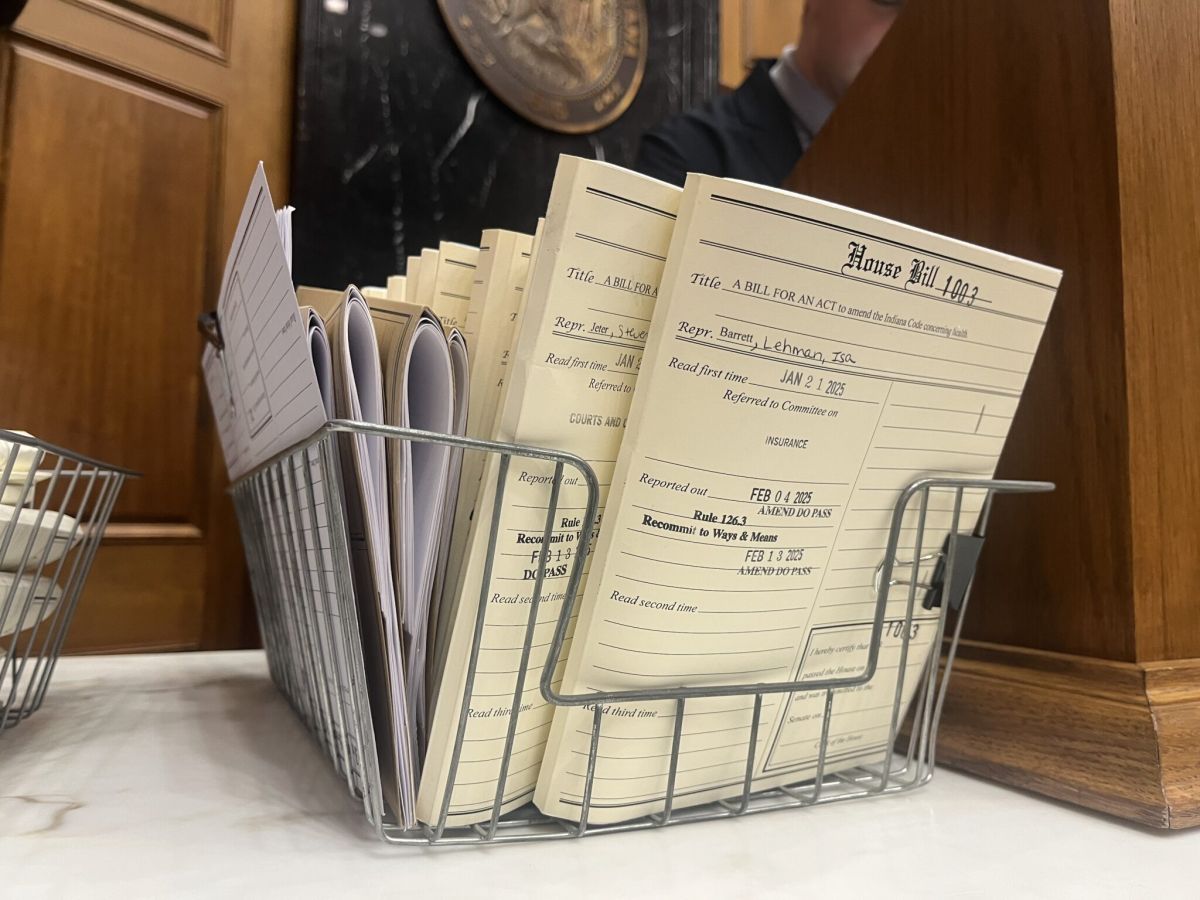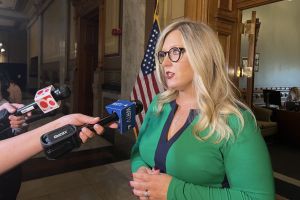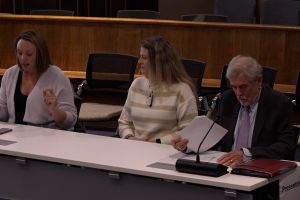
Topics addressed by the General Assembly spanned the gamut on Monday, including lab-grown meat, immigration, natural gas and more. (Whitney Downard, Indiana Capital Chronicle)
From immigration to lab-grown meat and natural gas to sheriff commissary funds, Indiana lawmakers tackled a bevy of topics on Monday.
Also on the Senate’s calendar were confidentiality additions to a health care transparency proposal that sparked bipartisan objections.
House Bill 1666 would require health care entities — like hospitals, insurers, pharmacy benefit managers and others — to report ownership information to state agencies; would create a board to approve mergers and acquisitions; and lets Indiana’s attorney general investigate a health care entity’s market concentration.
But, “there were a few issues that we overlooked,” Sen. Tyler Johnson told his colleagues from the Senate floor Monday. Johnson, R-Leo, is the Senate sponsor.
“Our goal is really not to out every business and corporation in the health care industry,” he said. “We actually put some individual practitioners at risk — think like scalping or takeovers and those kinds of things — by exposing some of that information.”
His amendment, accepted by voice vote, says that submitted ownership information is confidential and not subject to public records access laws.
“I don’t want to compile a list of those individuals. That was the original statement in the bill, and I don’t think that was the intent,” Johnson explained.
Two Indianapolis senators — Democrat Sen. Fady Qaddoura and Republican Sen. Mike Young— questioned the need for a carveout specific to the health care industry’s owners.
The measure already saw plenty of edits in the House, including several amendments easing the reporting process for eligible providers and exempting providers that are wholly owned by practitioners rather than corporations.
Immigration, lab-grown meat topics encounter some opposition
Several senators shared concerns about how law enforcement would interact with Hoosiers under a bill requiring sheriffs to notify federal authorities about suspected undocumented immigrants.
Senate sponsor Sen. Aaron Freeman maintained that House Bill 1393 would only apply for someone arrested on an unrelated misdemeanor or felony, not to someone who was stopped for a driving infraction, for example.
“Here’s the way this works: the police officer takes someone in their car into custody (and) they transport them to the local county jail,” said Freeman, R-Indianapolis. “There’s going to be a discussion between the police officer and the jailer … (but) there’s no identification. We don’t have a social security number. We don’t know who this person is.
“The jail is going to alert (Immigration and Customs Enforcement) or whatever immigration officers there are.”
A previous version of the bill would have left notification duties to arresting officers, which Freeman amended out along with language specifying that suspicion alone wasn’t cause to detain someone.
“As the bill originally came to our committee a week ago, I might agree … that it could have allowed law enforcement to be out randomly picking people up who have not committed some criminal offense,” said Freeman. “I don’t want our law enforcement out there bullying people … that’s a bridge too far for me and something I couldn’t support.”
Sen. Rodney Pol, D-Chesterton, shared the story of his Puerto Rican grandfather, who moved to northern Indiana to work in the steel mills. A citizen and decades-long East Chicago resident, Pol said his grandfather spoke English with a heavy accent and used more of his native Spanish as he aged.
In his 80s, driving with expired insurance, his grandfather — who joined the U.S. Army at 18 — was in an accident.
“Police officers couldn’t identify him; he’s only speaking in Spanish. They didn’t understand what was going on. And had they been forced to, they could have arrested him on a misdemeanor,” said Pol. “… I could have had to have dealt with an ICE referral for somebody who has been a United States citizen. Somebody who has worked his entire life to provide for his family. Somebody who served this country.
“And the officers would have been required to do so.”
Rokita weighs in on federal education moves, Indiana immigration bill
Current law, Pol said, wouldn’t require officers to notify ICE about someone like his grandfather. He said some notifications are already occurring in Indiana’s jails, making this bill unnecessary.
Two Republicans joined with eight Democrats to vote against the bill, which moved on a 37-10 vote.
A bill to ban the sale of lab-grown meat until the completion of a state study also split the party caucuses.
“There’s going to be a one-year moratorium in Indiana while we have our Department of Health, Board of Animal Health and Department of (Agriculture) do a study and report back to the Legislative Council at the end of December so we can determine where to go forward with this,” said Sen. Jean Leising, R-Oldenburg.
Leising noted that at least two other states, Florida and Alabama, have banned manufacturing and selling the product while another, Mississippi, appeared to be close behind.
One Democrat, Indianapolis Sen. Greg Taylor, joined with five Republicans to oppose House Bill 1425, which also contains labeling requirements for lab-grown meat products. Both bills return to the House, which will vote to accept or reject the Senate amendments.
Natural gas and commissary funds in the House
A Senate proposal that would define natural gas and propane as “clean” or “green” energy in Indiana code encountered little opposition in the House on Monday, with 73 members advancing Senate Bill 178 over 20 opposing votes. It heads to Gov. Mike Braun’s desk.
The designation allows natural gas operators to qualify for certain federal and state incentives.
Rep. Matt Pierce, D-Bloomington, opposed the measure from the floor, saying that natural gas should instead be recognized as a “transition” tool for moving from fuels like coal to renewables like solar and wind.
“The great thing about renewable energy is there’s no fuel costs. You don’t get charged by mother nature for what’s going to fuel that energy,” said Pierce. “Whereas (with natural gas and propane), you’re going to have a fuel charge.”
Pierce said that cost got passed along to energy consumers.
“If we were truly in a clean energy economy, we wouldn’t have to worry about the ups and downs of fuel costs,” Pierce said. “… I think this is just another way of delaying the inevitable and putting more expensive costs on our residents.”
But not all of Pierce’s colleagues agreed.
Freshman Rep. Alex Burton, D-Evansville, pointed to expensive utility bills in his southwestern district, saying that some community members had moved to neighboring states in pursuit of a lower cost of living.
“This new policy change may lead to our communities in Southwest Indiana accessing grants and subsidies that ultimately reduce our monthly energy bills,” Burton said in a release. “While some may question this policy, this piece of legislation is the first this session to offer a clear path to relief for overburdened Hoosiers. I will continue to work with my colleagues in the legislature, the Braun Administration, and the federal government to address unreasonable consumer utility costs.”
The House chamber also unanimously accepted Senate amendments to a House bill regarding sheriff commissary funds, sending it to Braun for his signature.
House BIll 1208 increases fund oversight, requires quarterly reporting and tightens training requirements.
Though she didn’t speak on the floor, Rep. Wendy Dant Chesser, D-Jeffersonville, praised the legislation in a release and tied it to the actions of disgraced former Clark County Sheriff Jamey Noel, who is serving a prison sentence after pleading guilty to over a dozen felony charges, including the misuse of public funds.
“It was the actions of Jamey Noel that made me such a staunch supporter of this legislation,” Dant Chesser said in a release. “We can’t turn back the clock to prevent hundreds of thousands being stolen from the Clark County community. Clark County experienced a real-life tabloid scandal that’s not going away. But we can improve our laws to protect ourselves in the future.”
GET THE MORNING HEADLINES.
Indiana Capital Chronicle is part of States Newsroom, a nonprofit news network supported by grants and a coalition of donors as a 501c(3) public charity. Indiana Capital Chronicle maintains editorial independence. Contact Editor Niki Kelly for questions: info@indianacapitalchronicle.com.











